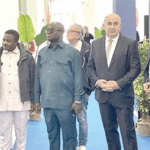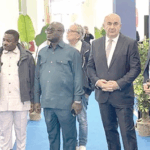
Ghana has secured €154 million funding from the Italian government to modernise the agricultural value chain and boost food security in the country.
The Minister of Food and Agriculture, Eric Opoku, signed the deal on behalf of the country last Friday on the sidelines of the Eighth Agrilevante Fair in Bari, Italy.
The Italian Minister of Agriculture, Francesco Lollobrigida, signed on behalf of his country.
The Managing Director of BF International Best Fields Best Food Limited, M. Federico Vecchion, and Georges Mikhael of S.r.I., signed for the Italian private sector enterprises.
The funding is under a project known as “Strengthening Agri-Food Ecosystems in Ghana,” a three-year initiative that starts next week and will run up to 2027.
The resources will be channelled into investments and public-private partnerships between Ghanaian and Italian agricultural institutions and private sector actors to improve food security and strengthen resilience to climate change.
Mr. Opoku told the Daily Graphic last weekend that under the project, 10,000 hectares of land would be developed into a model farm for the production of maize, rice, tomatoes, and soya.
“The farm will operate under full-year irrigation to ensure continuous production, with all produce targeted at supplying the domestic market.
This is part of President John Dramani Mahama’s Agriculture for Economic Transformation Agenda,” the Minister of Food and Agriculture said.
He explained that under the arrangement, an Italian organisation, namely the International Centre for Advanced Mediterranean Agronomic Studies (CIHEAM), would collaborate with Ghana’s Council for Scientific and Industrial Research (CSIR) to produce a soil testing and crop suitability chart to guide production and to improve efficiency.
Additionally, CIHEAM will work with the West Africa Centre for Crop Improvement (WACCI) of the University of Ghana to establish a national seed bank.
Mr. Opoku disclosed that the direct beneficiaries of the initiative would include workers and staff of the model farm, soil analysts, seed bank agents, farmers’ associations, Ministry of Food and Agriculture officials, and young agricultural entrepreneurs.
The indirect beneficiaries would be approximately 23,000 residents of the Aveyime-Battor area, as well as the wider Volta Region, which is home to over 1.6 million people, who would benefit from the project’s scalability, he added.
Mr. Opoku’s participation in the Agrilevante Fair, held from October 7 to 11 this year, formed part of the broader collaboration with the Italian private sector aimed at transforming Ghana’s agri-food system into a more productive, inclusive, and sustainable sector.
He said beyond agricultural production, the project would cover significant social infrastructure development, with the construction of schools, toilet facilities, social centres, and information and communication technology (ICT) hubs for communities in the project area.
The overarching goal of the initiative is to improve food security and build climate-resilient local food systems aligned with the Sustainable Development Goals (SDGs) of the United Nations, Mr. Opoku added.
Background
The Strengthening Agri-Food Ecosystems in Ghana initiative focuses on developing and strengthening agri-food value chains, agricultural and civil infrastructure, and the capacities of institutions and local communities through targeted investments and partnerships.
The project is expected to deliver 10,000 hectares of irrigated farmland, cultivated and sustainably managed, along with the construction of social and community facilities to improve rural livelihoods, and enhanced institutional and technical capacity in modern farming systems and governance.
- President Commissions 36.5 Million Dollars Hospital In The Tain District
- You Will Not Go Free For Killing An Hard Working MP – Akufo-Addo To MP’s Killer
- I Will Lead You To Victory – Ato Forson Assures NDC Supporters
Visit Our Social Media for More




